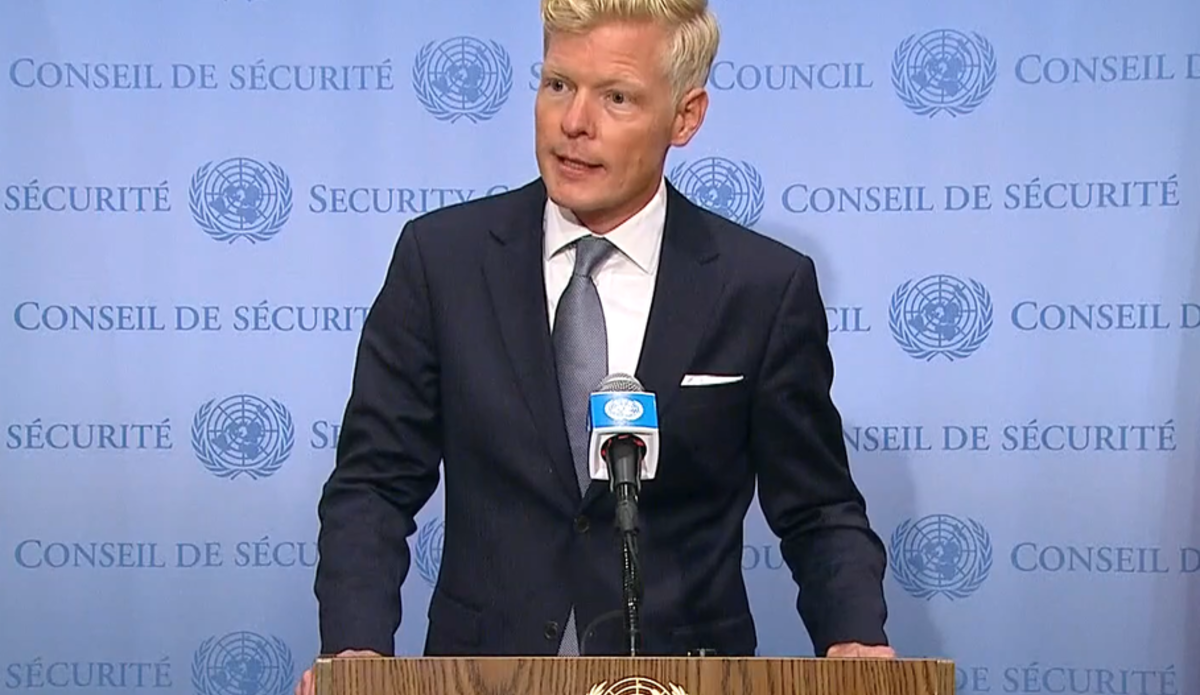Transcript of media stakeout by UN Special Envoy for Yemen, Hans Grundberg, following Security Council briefing
|
Good morning, all, I am glad to be here with you today. I will just say a few words first about where we are with mediation in Yemen. As I just briefed the council, recent developments are bringing Yemen to a crossroads, once again. As you must have followed, Yemen’s involvement in the regional escalation just got more concerning with Ansar Allah’s drone attack against Tel Aviv last Thursday, and Israel’s attack on Al Hudaydah on Saturday. Targeting of ships in the Red Sea continues, and UK and US airstrikes against targets in Yemen continue as well. On the domestic front, the parties informed me last night that they reached an agreement on four points to de-escalate the months-long standoff on the banking sector and on the operation of Yemenia Airways. Similar to the commitments they made in December, the understanding they reached last night also underlines the commitments to convene and engage in dialogue. I told the Council that we have been here before and that previous opportunities have slipped in the past because they never translated into structured dialogue on underlying issues. I, of course, accepted to provide the parties with the all the support they asked for to implement the measures they chose for themselves. And I fully expect them to translate their stated commitment to de-escalation in accepting my Office’s invitation for a dialogue aimed at addressing the economic issues including the need for monetary policy coordination, and progressing towards a unified central bank and currency, and guarantees to ensure the independence of the central bank from political interference. Stopgap measures could serve as a band aid. But being serious about building an economy that benefits all Yemenis means that the parties also have to engage on underlying, longer-term issues. It might sound futile to stand here time and again to say the same thing over and over, but it is not. National, regional, and international stakeholders are making conscious choices. Yemen and Yemenis are the ones who pay the price for these choices. It doesn’t have to be that way. Dialogue is always available and we have been working relentlessly to bring the parties together to resolve the urgent economic issues at stake, and to sustain and secure newly open roads and coordinate the opening of new ones, to release conflict-related detainees on all sides, and to manage frontlines and make sure Yemen doesn’t slip back into large-scale violence. Convening as per our invitations doesn’t take away from the commitments they made to the roadmap or to the understanding they reached last night. They must meet and negotiate in good faith to ensure forward movement and successful implementation of the measures they agreed, and to reverse the escalatory course they have taken in recent months, quickly. For this to happen, we need an environment conducive to constructive dialogue. This includes regional de-escalation and concerted regional and international support to the path of peaceful mediation. This also means a safer operational environment where UN and civil society personnel can work without fear of being targeted. It has been almost two months since the campaign of arbitrary detentions that include 13 UN personnel and dozens from humanitarian and civil society organizations were taken by Ansar Allah, never to be heard from since. It is unacceptable and they must be released immediately and unconditionally. Thank you very much and I will now take a couple of questions. Question from Al-Quds Al-Arabi. Thank you so much for your briefing. Abdul Hamid Siam from the Arabic Daily Al-Quds Al-Arabi, I heard the word Houthi Terrorist quite a number of times during the briefing by a number of delegates, does the UN share this classification of the Houthis as terrorists? UN Special Envoy: No, the United Nations is not engaging in such a classification. We engage with the Yemeni parties, of which the Houthis are one of. Or Ansar Allah is being seen as one of the parties we engage with, and that is how this been done.
And my second question: The US and the UK comes all the way from overseas to assist Isreal and bombard Yemeni targets, why when the Yemeni try to help their Palestinian brothers and sisters then they are condemned? UN Special Envoy: I think you highlight one issue of concern from my end, and without entering into the suffering and the necessity to see the conflict in Palestine be resolved and the situation in Gaza come to a peaceful end and a ceasefire being established there, without entering into that issue. Focusing on the matter that I work with which is Yemen we have seen since a gradual development in Yemen, where the conflict that we are trying, and the United Nations has been trying to assist the Yemenis in resolving, has gradually been drawn into the regional destabilization that we are seeing in the region right now, and that is not helpful if we want to see a solution to the conflict in Yemen. Because it adds an additional layer to the solutions making, so seeing Yemen become gradually part of the regional destabilization that we are seeing is something that I want to avoid. And there, I think, continuous engagement with the parties in terms of making sure that they also understanding their own responsibilities in prioritizing Yemen and making sure that Yemen itself needs to be addressed as a matter of priority, is going to continue to be my matter of focus. That doesn’t mean that the principled positions of the United Nations are not true all-at-once. In the United Nations we still remain very much in favor of a ceasefire in Gaza and has been so from the very onset. The United Nations will also not accept the targeting of civilians or civilians’ infrastructure regardless of if they are at sea or at land, regardless of where they are. And the United Nations is also, very much from a principled point of view, going to continue to work for a long-term and a just peace in Yemen. Thank you very much. Video: Hans Grundberg (SESG) on the situation in Yemen - Security Council Media Stakeout
|
 UN
UN







